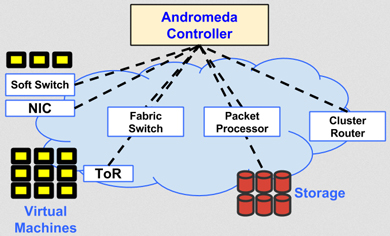News
Google Unveils Software-Defined Networking Technology
- By David Ramel
- April 02, 2014
Google this week unveiled "Andromeda," the code name for its new software-defined networking (SDN) technology that is powering its internal services.
Andromeda will be available to users of Google's Cloud Platform, announced Amin Vahdat, a distinguished engineer at Google, in a blog post Wednesday. Vahdat described Andromeda as an SDN-based substrate for Google's virtualization systems, rather than an independent networking product. Cloud components like firewalls, routing and forwarding rules will see better performance by using the Andromeda APIs, he said.
Immediately, only customers in two Google Compute Engine zones will see faster performance in their network connections, but the latest network virtualization stack is expected to be rolled out worldwide in the coming months.
Google is already deeply invested in SDN technology, with executive Urs Hölzle having explained two years ago how the nascent technology had boosted performance of internal networks. He reportedly said at the time that he expected the company within two years to have SDN control over the external network via the OpenFlow protocol used to manage network components, basically communicating between the control and data planes.
Now, two years later, Vahdat said Google enjoys programmable access to the entire network stack, from low-level hardware to high-level software, which lets it orchestrate operations "across virtual machines, hypervisors, operating systems, network interface cards, top-of-rack switches, fabric switches, border routers, and even our network peering edge."
 Andromeda's architecture. (Source: Google)
Andromeda's architecture. (Source: Google)
Earlier this month he described the details of Andromeda in a keynote presentation at the Open Network Summit. "We have a number of services that we already offer to customers, but we find that we can't predict them all, so having an API for NFV, network function virtualization, will present big opportunities," he said. He said many of the benefits of the cloud are enabled by network virtualization. "It's the network that ties all this together. You need a flexible, high-performance network virtualization infrastructure to deliver these benefits."
Vahdat expounded on this in Wednesday's blog post. "Andromeda's goal is to expose the raw performance of the underlying network while simultaneously exposing [NFV]," he said. "We expose the same in-network processing that enables our internal services to scale while remaining extensible and isolated to end users. This functionality includes distributed denial of service (DDoS) protection, transparent service load balancing, access control lists and firewalls."
The programmable access to all network components lets Google engineers design end-to-end solutions that are secure and performant, Vahdat said, instead of having to deal only with available network insertion points, which could result in "compromised solutions."
About the Author
David Ramel is an editor and writer at Converge 360.